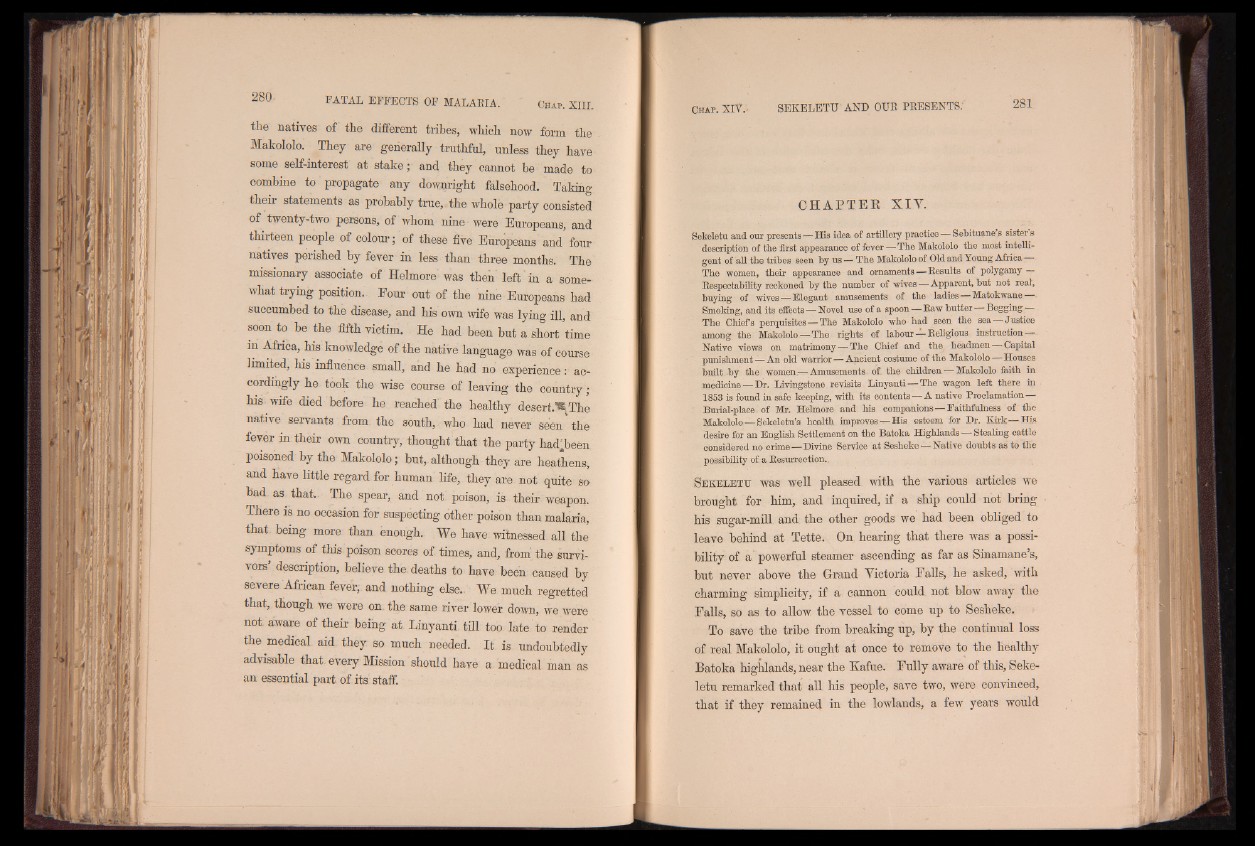
the natives of the different tribes, which now form the
Makololo. They are generally truthful, unless they have
some self-interest at stake; and they cannot he made to
combine to propagate any downright falsehood. Taking
their statements as probably true, the whole party consisted
of twenty-two persons, of whom nine were Europeans, and
thirteen people of colour; of these five Europeans and four
natives perished by fever in less than three months. The
missionary associate of Helmore was then left in a somewhat
trying position. Four out of the nine Europeans had
succumbed to the disease, and his own wife was lying ill, and
soon to be the fifth victim. He had been but a short time
in Africa, his knowledge of the native language was of course
limited, his influence small, and he had no experience: accordingly
he took the wise course of leaving the country;
his wife died before he reached the healthy desert.^The
native servants from, the south, who had never seen'the
fever in their own country, thought that the party had^been
poisoned by the Makololo; but, although they are heathens,
and have little regard for human life, they are not quite so
bad as that. The spear, and not poison, is their weapon.
There is no occasion for suspecting other poison than malaria,
that being more than enough. We have witnessed all the
symptoms of this poison scores of times, and, from the survivors’
description, believe the deaths to have been caused by
severe African fever, and nothing else.. We much regretted
that, though we were on the same river lower down, we were
not aware of their being at Linyanti till too late to render
the medical aid. they so much needed. I t is undoubtedly
advisable that, every Mission should have a medical man as
an essential part of its staff.
C H A P T E R XIY.
Sekeletu and our presents—His idea of artillery practice — Sebituane s sister s
description of the first appearance of fever—The Makololo the most intelligent
of all the tribes seen by us —The Makololo of Old and Young Africa —
The women, their appearance and ornaments—Results of polygamy
Respectability reckoned by the number of wives—Apparent, but not real,
buying of wives—Elegant amusements of the ladies Matokwane
Smoking, and its effects—Novel use of a spoony Raw butter Begging
The Chiefs perquisites—The Makololo who had seen the sea Justice
among the Makololo — The rights of labour -X Religious instruction —
Native views on matrimony — The Chief and the headmen — Capital
punishment — An old warrior — Ancient costume of the Makololo—Houses
built. =by the women.— Amusements of. the children — Makololo faith in
medicine-—Dr. Livingstone revisits Linyanti —The wagon left there iii
1853 is found in safe keeping, with its contents — A native Proclamation —
Burial-place, of Mr. Helmore and his companions — Faithfulness of the
Makololo — Sekeletu’s health improves —His esteem for Dr. Kirk—His
desire for an English Settlement on the Batoka Highlands — Stealing cattle
considered no crime—Divine Service at Sesheke^ Native doubts as to the
possibility of a Resurrection..
Se k e l e t u was well pleased with, the various articles we
brought for him, and inquired, if a ship could not bring
his sugar-mill and the other goods we had been obliged to
leave behind at Tette. On hearing that there was a possibility
of a powerful steamer ascending as far as Sinamane’s,
but never above the Grand Victoria Falls, he asked, with
charming simplicity, if a cannon could not blow away the
Falls, so as to allow the vessel to come up to Sesheke.
To save the tribe from breaking up, by the continual loss
of real Makololo, it ought at once to remove to the healthy
Batoka highlands, near the Kafue. Fully aware of this, Sekeletu
remarked that all his people, save two, were convinced,
that if they remained in the lowlands, a few years would